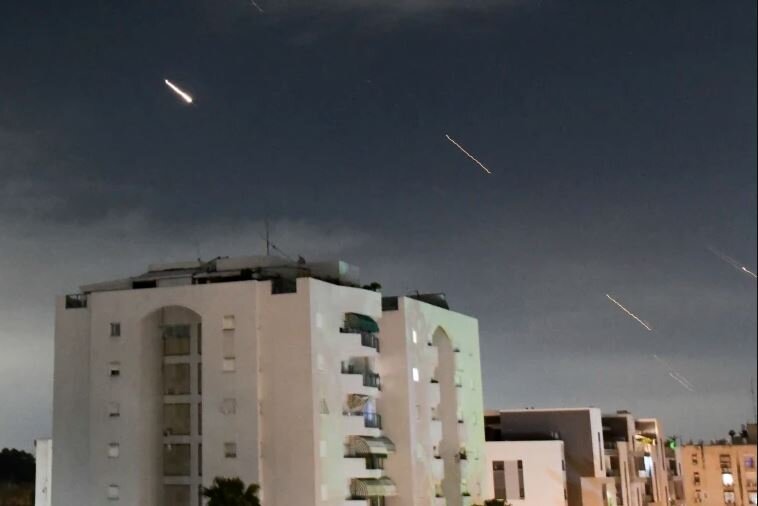10 Questions and answers about Iran's retaliatory attack on Israel

The Iranian operation on April 13, which aimed at the occupied territories, made headlines worldwide. Let's briefly examine the various aspects of the attack known as "Truthful Promise" to comprehend Iran's rationale and decision-making behind the offensive.
1- Why did Iran attack Israel?
On April 1, Israeli warplanes targeted the consular section of Iran's embassy in Damascus, in a clear violation of international law. The attack took the lives of 13 people, including a high-ranking military official.
Attacking another country's embassy is a direct breach of the Vienna Convention on Diplomatic Relations, which guarantees the inviolability of embassies and protection from any form of harm or interference. In response to this unlawful act, Ayatollah Seyyed Ali Khamenei, Leader of the Islamic Revolution, pledged to hold the regime accountable for its egregious actions.
2- What was the legal basis for Iran's attack?
Article 51 of the UN Charter states that "nothing in the present Charter shall impair the inherent right of individual or collective self-defense if an armed attack occurs against a Member of the United Nations until the Security Council has taken measures necessary to maintain international peace and security." This article recognizes the right of countries to defend themselves against armed attacks.
3- Is Iran's attack on Israel the beginning of a war?
In its attack, Iran used its less advanced weaponry in relatively low quantity. It also made sure that no infrastructure or civilian sites were hit during the operation. Iranian military leaders have explicitly explained that they are not looking for a war and that the attack was meant to send a message to Israel. They, however, warned that the country is ready to severely and firmly respond to any new aggression by the Zionist regime.
4- What type of weapons did Iran use in its attack?
The specific weapons used by Iranian forces in the attack on Israel have not been officially disclosed. But we might still be able to guess what armaments were used by analyzing videos circulating online. The country is said to have deployed Shahed-136 drones, as well as 2nd or 3rd-generation missiles such as Paveh, Emad, Rezvan, and Sejjil. Some speculate Fateh ballistic missiles were also put to use.
5- What targets in Israel did Iran attack?
The country’s military figures did not disclose the exact location of the targets. They declared that military bases were hit from the occupied Golan heights to Negev, and successfully destroyed.
According to a senior American official talking to ABC News, at least two military bases in the occupied territories have come under attack by 9 ballistic missiles: The Nevatim airbase and the Negev airbase.
Iran says the destroyed military sites were used to carry out the April 1 attack on Iran’s embassy.
6- What did Iran achieve by Operation Truthful Promise?
As stated by the country’s officials several times, Iran is not looking to start a war but it wants its redlines to be respected.
The IRGC’s Chief Commander has explained that the operation has “opened a new chapter” for Iran in the fight against the Israeli regime.
Major General Hossein Salami said that from now on, Iran “will respond from its own soil to any attack by Israel on Iranian interests, assets, notable people and citizens in any part of the world.”
7- Did Iran use all of its military capabilities for the attack?
Tehran has far more advanced weapons than the ones it used in the Saturday attack against Israel. Its arsenal consists of hypersonic missiles as well as extremely sophisticated UAVs like Gaza. It is also believed to possess hundreds of thousands of missiles and drones of different kinds.
8- Which countries assisted Israel in air defense?
So far reports and official remarks show that the U.S., UK, France, and Jordan helped Israel intercept Iranian projectiles during Tehran’s five-hour attack against the occupied territories.
Sources have informed the Tehran Times that more countries in the region aided Israel on Saturday than the ones known to the public. The Tehran Times may decide to release further information on this matter in the future.
9- What was the UN Security Council's reaction to Iran’s retaliation?
The UNSC meeting convened after Iran’s retaliation was divided. Member states like the U.S. and UK, which have been supporting Israel throughout its genocidal campaign in the besieged Gaza Strip, condemned Iran without attributing any responsibility to the regime for its attack on diplomatic premises.
Others like China and Russia, pointed out that the root cause of the escalating tensions in the region is Israeli aggressions while emphasizing that Iran had the right to respond to the attack on its embassy.
10- Will Israel respond to Iran’s retaliation?
Predicting the future requires us to pay close attention to different factors. The U.S. and its allies in the West have been urging Israel to see Saturday’s saga as a “win” and refrain from responding to Iran’s retaliation.
It is, however, important to note that Netanyahu and his cabinet are under extreme pressure and have a history of acting recklessly. They might decide to make another idiotic move as the regime has been unprecedently humiliated.
Leave a Comment